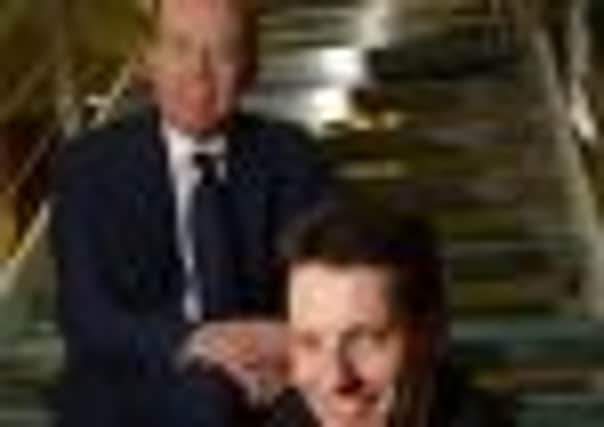Former HBOS chief admits to ‘incompetent’ lending at bank


Sir James, who led the bank between 2001 to 2005, was accused by MPs of “bailing out” by selling about two-thirds of his HBOS shares between leaving and its rescue takeover by Lloyds.
Sir James and his successor Andy Hornby appeared at the Parliamentary Commission on Banking Standards to answer for the bank’s pre-crisis lending and subsequent merger.
Advertisement
Hide AdAdvertisement
Hide AdSir James was asked repeatedly by the commission’s chairman Andrew Tyrie whether the bank’s lending was incompetent, particularly in its corporate banking arm.
“I do not think, with the benefit of hindsight, it was competent,” Sir James eventually admitted.
“It was incompetent?” asked Mr Tyrie.
“Yes,” he replied.
Sir James, who drove the merger of Halifax and Bank of Scotland in 2001, was asked if he should be stripped of his knighthood. Former Royal Bank of Scotland CEO Fred Goodwin lost his knighthood in January. He said: “That’s for others to decide. I’m completely realistic about my reputation.”
He added: “I’m in no doubt that my reputation and my achievements will never be seen in the same way.”
Advertisement
Hide AdAdvertisement
Hide AdHBOS was Britain’s biggest mortgage lender but its downfall was blamed on aggressive growth in its commercial banking division, poor risk management and exposure to weak economies such as Ireland. The bank was also heavily reliant on wholesale funding which dried up suddenly when financial markets froze during the crisis.
It was forced into a Government-brokered takeover by Lloyds TSB in late 2008. The Government waived competition concerns to allow the deal to complete in early 2009, and the taxpayer was left holding more than two-fifths of the combined Lloyds Banking Group after injecting £20bn.
Sir James, who lives in Harrogate, appeared before law-makers for the first time to explain the bank’s strategy and collapse.
“I was horrified and deeply upset by what happened,” said Sir James. “(It was) hugely distressing in every sense to see the impact on shareholders, former colleagues and also the consequences for taxpayers.
Advertisement
Hide AdAdvertisement
Hide Ad“So I am very sorry for what happened at the bank. I’m apologising for the fact that I played a major part in building a business that ultimately failed.”
The former chief executive described selling two thirds of his shares prior to the collapse as “balancing my portfolio of assets”, but was accused by Mr Tyrie of “bailing out” before the crash.
“I can see why people would think that but it certainly was not part of my motivation,” said Sir James. Sir James insisted HBOS did not see its reliance on wholesale money markets “as a risk to the bank”.
“We saw it as a risk to our strategy,” he said. Mr Hornby said the bank’s board may have had too much information from each division to fully understand the true risks before its near collapse in 2008. Mr Hornby, who was CEO from August 2006 until its Lloyds merger, admitted the bank’s corporate division had too much concentration in commercial real estate and failed to realise the threat of its over-reliance on wholesale funding.
Advertisement
Hide AdAdvertisement
Hide Ad“With hindsight, at times it may have been the case that the sheer volume of information supplied by every division right across operational risk, credit risk and regulatory risk may at times have made it harder for the board to fully understand the potential issues facing the business,” he said.
Mr Hornby, who also lives in Harrogate, added the closure of the wholesale money markets was “unforeseen and unprecedented”. He said: “I don’t believe wholesale markets closed, even in the 1930s, as they did in 2007 to 2008.”
Finance watchdog gets tough
BRiTAIN’S new financial watchdog will temporarily ban financial products for up to a year, rather than wait for the results of a full investigation if it feels they do not offer value for money or make it harder for consumers to shop around.
The Financial Conduct Authority (FCA) will be launched in April to help draw a line under two decades of mis-selling endowment mortgages, pensions, loan insurance and other products.
Advertisement
Hide AdAdvertisement
Hide AdThe FCA started a public consultation yesterday on how its anticipated powers to temporarily ban products or limit how they will be sold, would work in practice.
Martin Wheatley, chief executive designate of the FCA, does not expect to issue temporary bans and curbs often, but said having such powers meant the watchdog could act more quickly than in the past so that fewer consumers were harmed.
UK regulators have traditionally resorted to consultations and probes before issuing any warnings or taking action, at the risk of piling up consumer pain and compensation bills.
Temporary bans, unless backed by later changes to the FCA’s rules, could only